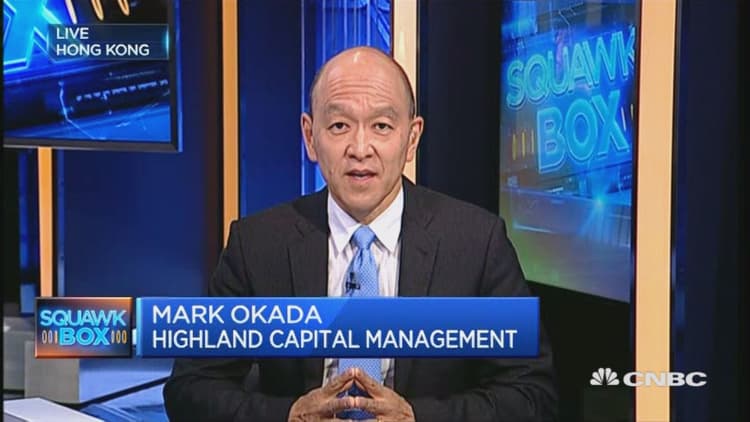
Developed market bond yields took another leg lower on Thursday as the market turned its focus back to concerns the U.K. may vote to exit the European Union in its looming referendum.
The moves were stark. The yield on the re-entered negative territory at negative 0.0267 percent at 2:55 p.m. SIN/HK, after having turned positive on Wednesday, although that was off a record low of around negative 0.035 percent touched earlier Thursday.
The yield on the 10-year Japan government bond (JGB) was trading at negative 0.198 percent at 2:58 p.m. SIN/HK after earlier touching a fresh record low of negative 0.202 percent.
The U.K.'s 10-year gilt touched a record low yield of 1.095 percent Thursday, while the U.S. 10-year Treasury yield touched four-month lows of around 1.541 percent.
"The bond markets are factoring in safe-haven demand," said Vishnu Varathan, senior economist at Mizuho Bank, based in Singapore. "Despite the [Brexit} risk placed temporarily on the backburner while the FOMC and the BOJ were in focus, the underlying risk hasn't faded."
Markets globally have become more volatility in recent days as opinion polls in the U.K. have begun to indicate the "leave" camp will prevail in the June 23 referendum on Britain's EU membership. Betting odds, which had been heavily favoring the remain camp, on Thursday fell to indicate a 65 percent implied probability Britain would stay in the EU, up from 62 percent Wednesday, Reuters reported, but that's down from levels over 70 percent earlier this month.
An exit would mean leaving the 28-nation EU, and untangling a host of complex trade and other deals that tie the country to the European bloc. Those agreements were not easy to make, and they would be exceedingly difficult to redesign or renegotiate. Uncertainty over the what the U.K. will need to give up in terms of its access to the continent's single market and in other trade deals it will need to re-negotiate has plagued markets.
One investor noted that even if the U.K. votes to remain in the EU, that volatility isn't likely to pass over easily.
"The Brexit is something that we've been calling as more likely than not as far as where the market is pricing it in," Mark Okada, chief investment officer at Highland Capital Management, told CNBC's "Squawk Box."
"Unfortunately, the things behind the Brexit are not going away anytime soon: the concerns around trade, the concerns around immigration, the concerns around income inequality, the concerns around overregulation," he said.
"Because of these concerns, that's fairly negative, so we're going to see some [economic] slowdown as these economies focus more on protectionism as opposed to globalization, which we know is actually a very positive dynamic," Okada added.
Others also pointed to potential long-term implications of a Brexit vote.
In a note on Wednesday, Nomura estimated that a Brexit would hit U.K. gross domestic product (GDP) by around 2 percent as it weakened the pound, pushed up inflation and spurred a housing market correction. That would dent global GDP by around 0.1 percent, it estimated.
"The markets are worried about their inability to gauge the big picture, for example the risk of something happening outside of trade channels," Nomura said. "In particular, the survival of the euro might be called into question if Brexit were to lead to an upsurge in anti-euro and anti-EU sentiment in other EU member states. We think it makes sense to worry that if the near-term trade impact were minimal, the longer-term impact might be substantial."
But Varathan also cited a host of other factors weighing on bond yields.
For one, he said the Fed statement Wednesday suggested the central bank's hiking cycle would be more gradual over the next couple years.
The Fed said on Wednesday that it would keep interest rates unchanged from the current 0.25-0.50 percent. The post-meeting statement also took a more dovish tone, with some indication that the central bank may hike rates only once this year, instead of the two increases previously flagged.
Others also looked to a combination of factors driving bond yields lower.
"Another day of record low bond yields are almost a given for this market," Chris Weston, chief market strategist at spreadbettor IG, said in a note Thursday. "A more dovish Fed is not the positive it once was and investors are saying 'if the Fed are worried then perhaps we should be as well.'"
The Fed said that Brexit was among the concerns spurring it to hold its fire on the next rate increase. Varathan also noted that a JGB auction earlier Thursday met with a lot of demand, which also weighed on yields. Bond prices move inversely to yields.
He also said that declines in oil prices were weighing on bond yields.
"Lower oil prices marry up with lower bond yields because oil prices have strong correlations with inflation expectations," he said.
Oil prices fell for a fifth straight day overnight. On Thursday afternoon Asia time, global benchmark Brent traded down 1.51 percent at $48.23 a barrel, after finishing down 1.7 percent overnight. U.S. crude futures were down 1.35 percent at $47.36, after dropping 1 percent in U.S. hours.
Follow CNBC International on Twitter and Facebook.
—By CNBC.Com's Leslie Shaffer; Follow her on Twitter @LeslieShaffer1


